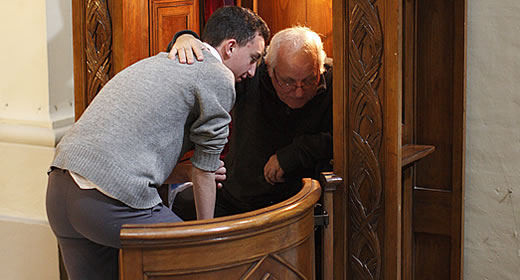
Summary: Historian Martin van Creveld reminds us of when we were free, and how tightly our lives today are regulated. Remembering what we have lost is the first step to a better future.

On Tuesday I asked what were the limits of our institutions’ power over us, as their regulation of our most intimate behaviors grows each year. In 1964, Berkeley students protested for the right the say “fu*k” and sleep together at will in dormitories {see Wikipedia}. Now universities and corporations regulate their subject’s speech (even jokes), who they flirt with, who they date, and countless other minutia of daily life. They want us to interact like drones serving a giant machine, with humanity – and all its mistakes and wonders – squeezed out. Like life in Orwell’s 1984. Who gives them this power?
Perhaps we allow it because we forgot what we lost. Here Martin van Creveld reminds us of a time when men and women were free. It was not that long ago.
“I Have a Confession to Make“
By Martin van Creveld. From his website, 24 October 2019.
 I have a confession to make. One morning thirty-seven years ago I was standing in front of a class at the Hebrew University in Jerusalem. The course was “The Scientific Revolution of the Seventeenth Century.” It had thirty students, most of them freshmen and -women in their early twenties (Israeli students, owing to their conscript service, tend to be two to four years older than their colleagues abroad). For many of them, mine was the first university class they had ever attended.
I have a confession to make. One morning thirty-seven years ago I was standing in front of a class at the Hebrew University in Jerusalem. The course was “The Scientific Revolution of the Seventeenth Century.” It had thirty students, most of them freshmen and -women in their early twenties (Israeli students, owing to their conscript service, tend to be two to four years older than their colleagues abroad). For many of them, mine was the first university class they had ever attended.
As a teacher in such a situation, what do you do? This was a workshop for the study of primary sources. The students knew nothing about anything. They themselves, being aware of that fact, either hesitated to speak up or went off in all kinds of weird directions. So you lower your expectations and try to explain a few elementary things; so elementary, perhaps, that they had never thought about them.
In this particular case, the point I wanted to make was very relevant to the topic at hand. Namely, that whatever is regarded as “normal” today may not have been so considered long ago; and the other way around, of course. By way of an example – this was long before students were supposed to require “safe places” to protect their tender souls – I asked the class what they would say if I stripped naked right there and then. It was, of course, meant as a joke. But also as an illustration of the kind of dramatic change history, moving along, often entails.
Sitting opposite me was a student about ten years older than most. Looking me straight in the eye she shot back, “I would like it very much.” The class roared with laughter, and I, I was later told, turned as red as a beet. From that point on the ice between them and me was broken and we spent a wonderful academic year discussing the likes of Francis Bacon, Galileo, and Newton. It was, incidentally, one of the very few courses I gave in which female students took a more lively part than male ones did. More important for the two of us, she and I continued on our own steam. First we went for a coffee, and the rest followed. About a year later Dvora – her name – and I decided to join forces and start living together. We still do.
Had the exchange taken place only a few years later, the outcome would have been entirely different. In any number of schools, both in Israel and abroad “flirting” with students, as well as other faculty members, is prohibited. So are making “suggestive” comments, “dating” (at what point does an extramural meeting with a student turn into a “date”?), “requests” for sexual activity, physical “displays” of affection, making “inappropriate” personal gifts, “frequent personal” communication with a student unrelated to course work or official school matters, “inappropriate” touching, and engaging in sexual contact and/or sexual relations. Briefly, anything that reeks, however slightly, of people getting to feel closer to one another would have caused those who engage in it to be censured, probably fired.
Social life is not math, which explains why none of the terms in quotation marks is capable of being defined. Any attempts to do so can merely lead to ever-growing confusion and, in the end, the kind of absurd hair-splitting lawyers produce in a never-ending stream. Such being the case, the inevitable outcome is to create a situation in which everyone is suspicious of everyone else. Everyone is constantly looking across his or her shoulder, and everyone has to consider every word he or she utters for fear it will be misinterpreted. An atmosphere less conducive both to teaching and to study would be hard to find.
Looking back over thirty-seven years, both Dvora and I thank our stars for the fact that, at the time, for a student to fall in love with her teacher, and the other way around, was still permitted. On top of that, I thank mine for the fact that cracking a joke, even a “suggestive” one, in the presence of young adult was still allowed. And also for the fact that, being 73 years old and an “emeritus,” I am no longer caught up in a system that puts so little trust in both faculty and students as to surround them with prohibitions of this kind.
As some Chinese sage – I forget which one – is supposed to have said: woe the generation whose teachers are afraid of their students.
Editor’s note
Institutions have such powers because we allow it. We can be free again. But it has, as always, to be fought for.

About the Author
Martin van Creveld is Professor Emeritus of History at Hebrew University of Jerusalem, and one of the world’s most renowned experts on military history and strategy. See his Wikipedia entry.
The central role of Professor van Creveld in the development of theory about modern war is difficult to exaggerate. He has written 24 books about almost every significant aspect of war. See links to his articles at The Essential 4GW reading list: Martin van Creveld.
OF more general interest are his books about western culture: Men, Women & War: Do Women Belong in the Front Line?, The Privileged Sex, and Pussycats: Why the Rest Keeps Beating the West.
To better understand our future, see his magnum opus – the dense but mind-opening The Rise and Decline of the State – describes the political order unfolding before our eyes.
His latest book is Hitler in Hell, a mind-blowing memoir “by” one of the most remarkable men of 20th century.